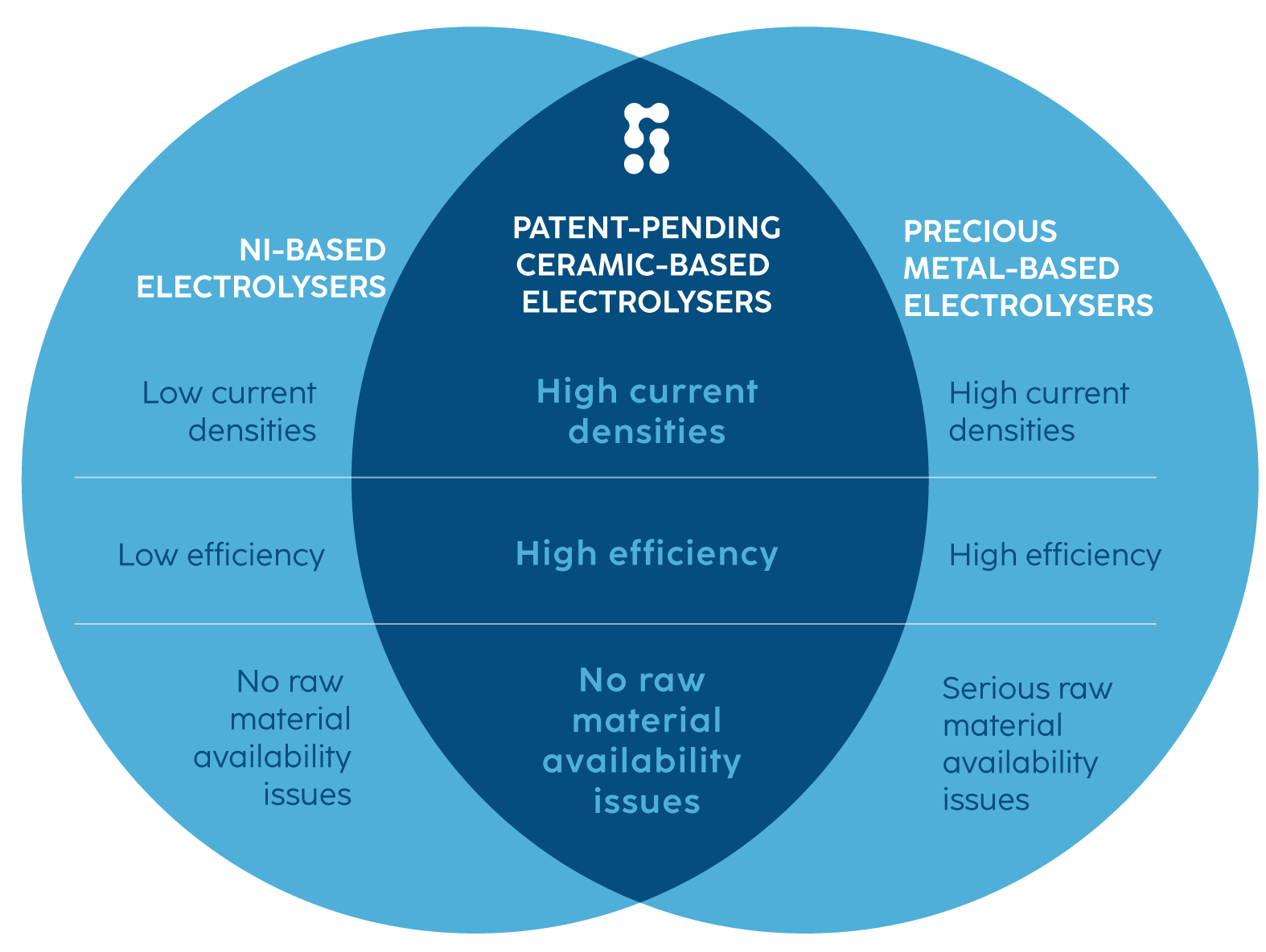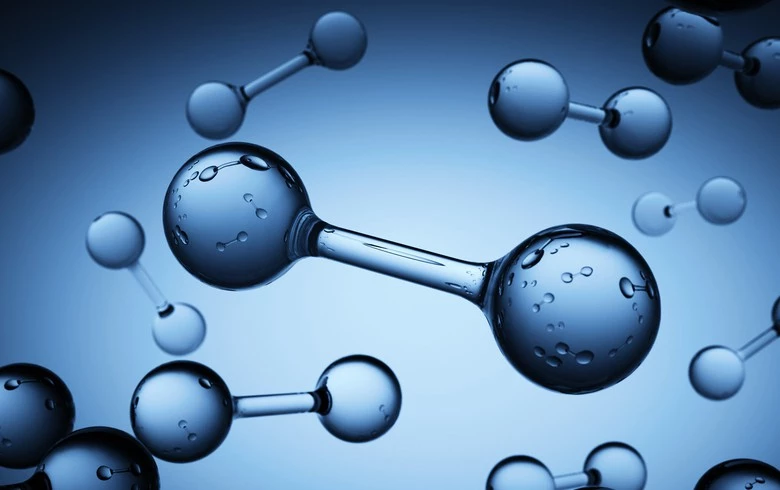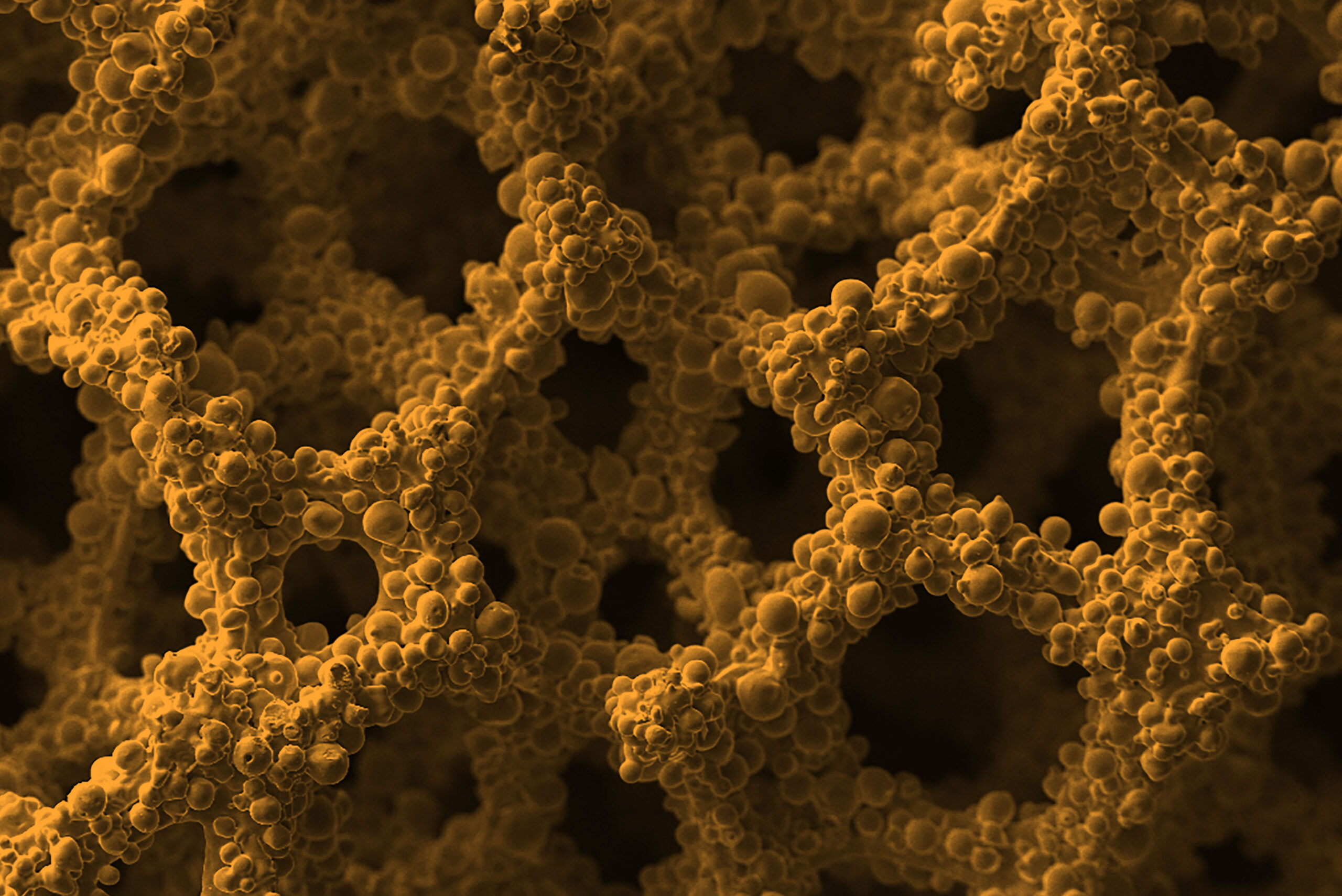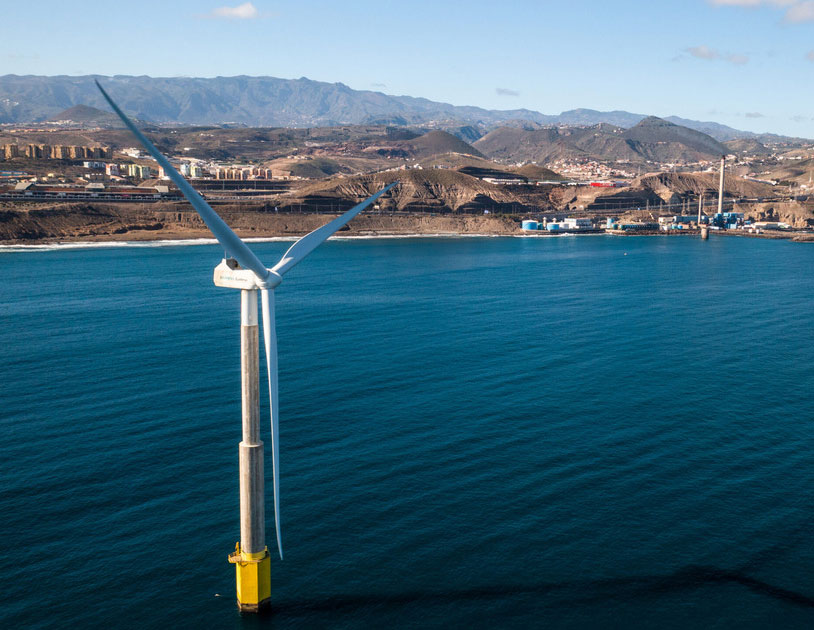Innovation in alkaline electrolysis technology

Alkaline electrolysis is the most robust and proven form of electrolysis to produce hydrogen from water. Despite the proven technology, no ready-made solution for large-scale industrial applications exists. The need for such solutions is emerging from the rapid roll-out of electrolysers deployment in novel domains.
At Stargate, we strongly believe that alkaline electrolysis technology has a lot of untapped potential left, and we are actively pursuing ways to improve the efficiency and lower the cost of alkaline cells, stacks and systems.
The current state of alkaline electrolysers
Although alkaline electrolysis technology is often described as being free of precious metals, the fact is that a large fraction of alkaline electrolysers are still utilising electrodes made of ruthenium and iridium which are some of the rarest elements in Earth’s crust.
While such electrolysers boast high current densities and high efficiency, their wider adoption is hindered by raw material availability issues. Nickel-based alkaline electrolysers do not face raw material availability issues, but suffer from lower current densities and lower efficiencies.
Beyond the State-of-the-Art in Alkaline Electrolysis
At Stargate, we build upon the best aspects of proven alkaline technology and complement it with breakthrough materials. This results in a completely new class of electrolysers: ceramics-based alkaline electrolysers, that have high current densities, and high efficiencies, yet contain no precious metals. This results in significantly lower hydrogen production costs and makes the electrolysers affordable for the end-users.



Our unique electrode technology relies heavily on scientific research
100% owner of the intellectual property
Fully equipped R&D Centre
Decades of combined experience
Authored 100+ scientific publications
Prior experience from renowned companies
Our partners
Stargate is a member of the European Clean Hydrogen Alliance (ECHA), Hydrogen Europe, Estonian Hydrogen Association, Latvian Hydrogen Association, EU Electrolyser Partnership, BotH₂nia-network, and belongs to Hydrogen Technology IPCEI.
Stargate R&D and demonstration projects
Stargate is participating and has initiated several R&D and demonstration projects.
ELECTROLIFE – Enhance knowledge on comprehensive electrolysers degradation technologies towards industrialization – Clean Hydrogen Partnership project
Duration: January 2024 – December 2028
ELECTROLIFE aims to enhance the comprehensive knowledge on degradation mechanisms and improvement of the cell performance to increase the efficiency performance of electrolysers by reducing the use of critical materials and extending the useful life of these systems. Learn more about the project here.

ENDURE – Elevating Alkaline Electrolysers through Enhanced Current Density and Stability – Clean Hydrogen Partnership project
Duration: January 2024 – December 2026
The main objective of ENDURE is to improve the current density and stability of electrolysers bringing the performance and durability of alkaline electrolysers to a new level. The number of publicly available durability data on alkaline electrolysers is scarce; therefore, the efforts will contribute to enriching the understanding of current density and stability of electrolysers for the scientific community. Learn more about the project here.

EXSOTHyC – Exsolution-Based Nanoparticles for the Lowest Cost Green Hydrogen – Clean Hydrogen Partnership project
Duration: January 2024 – December 2026
The main objective of the EXSOTHYC is to develop and validate a next generation alkaline electrolyser short-stack prototype with a novel cell design containing disruptive sub-components and breakthrough materials to fulfil the future needs of gigawatt-sized storage of renewable energy. Learn more on the EXSOTHyC Project Website

Horizon Europe green hydrogen full value chain demonstration project
Duration: September 2023 – August 2028
Within the project, green hydrogen will be produced at an onshore facility by using marine-based renewable energy. Stargate’s role is to provide and install its novel 1 MW electrolyser to substitute conventional fuel with green hydrogen. The project is implemented in Gran Canaria as a joint collaboration of ten international partners. Read more about the project here.

Important projects of common European Interest – IPCEI
Duration: July 2022 – June 2027
Stargate’s project has been approved by the European Commission under the framework of IPCEI Hydrogen Technologies. Within the project, a mass-manufacturable and highly efficient precious metal-free 1 MW ceramics-based alkaline electrolyser will be developed and the production of the electrolysers increased to an industrial scale. The project will be implemented in cooperation with 5 direct and 15 indirect partners from across Europe. Stargate-led IPCEI’s ultimate goal is to establish first-of-its-kind manufacturing facilities for high-efficiency alkaline electrolysers. Read more about the project here.

Applied Research Project “Developing and Validating Alkaline Electrolysis Stack Technology with Nanoceramic Electrodes”
Duration: July 2022 – June 2025
The main objective of the project is to develop and lab-validate a 0.5-MW alkaline electrolyser stack lab prototype, one of the main components of an alkaline electrolyser. The project is the first stage of Stargate’s IPCEI project, which aims to establish a first-of-its-kind manufacturing facility for high-efficiency alkaline electrolysers.

Deployment of green hydrogen in public transportation
Duration: December 2021 – November 2024
Stargate is participating in a national demonstration project for green H2 uptake in the transport sector administered by Estonian Environmental Investment Center.



We are open to collaboration. We are interested in both demonstration and research projects in various fields.
Please contact us for more insights.
